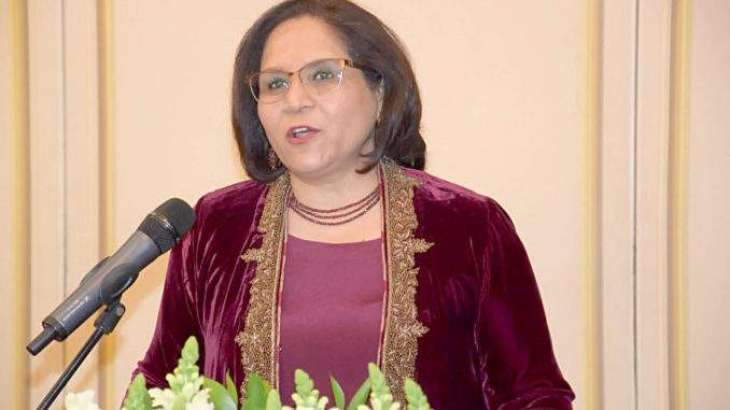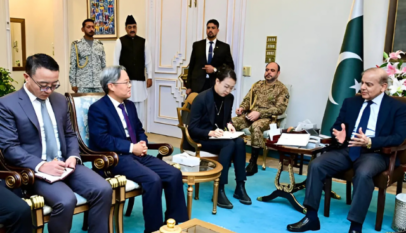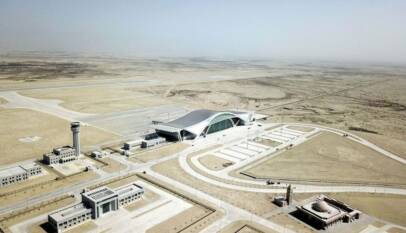Pakistan China friendship is strong enough to withstand any kind of crisis: Ambassador Naghmana Hashmi
Since 1950s, China and Pakistan have enjoyed a close and mutually beneficial relationship. The two countries enjoy increasingly robust ties. Over the past 69 years, Pakistan remained China’s steadfast ally. China places greater value on its relationship with Pakistan. It has long provided Pakistan with economic, military and technical assistance. The launch of China Pakistan Economic Corridor, a flagship project of China’s Belt and Road Initiative (BRI), is the testimony of Pakistan-China friendship. The CPEC has contributed to the socio-economic development of Pakistan and the whole region. Amid the outbreak of COVID-19, China’s timely assistance and constant support are remarkable. China has set a precedent in fostering international cooperation under the successful execution of BRI and also in the fight against COVID-19. Despite the outbreak of global pandemic and other challenges, Pakistan China friendship is certain to grow stronger in the time ahead.
Reflecting on the monumental journey traversed by Pakistan and China over the past seven decades calls to mind the Chinese proverb: “Finding a soulmate who knows one’s heart is far harder than striking gold.” On the international stage, where ceaseless change is the only certainty along the long road to harmonious interdependence, I marvel at the wisdom of successive generations of our two nations for forging a bond stronger than steel, and bequeathing this invaluable legacy for those to follow. Our forebears have done well by us.
In 1950, Pakistan became the first Muslim and third non-Communist country to recognise the People’s Republic of China. The establishment of diplomatic ties – of which we mark the 69th anniversary today – followed a short year later, and under personal handwritten instructions from Chairman Mao Zedong to the Chinese Foreign Ministry. The first high-level contact between Prime Minister Mohammad Ali Bogra and Premier Zhou Enlai on the sidelines of the Bandung Conference in 1955 initiated a tradition of frequent exchanges that endures to this day.
Premier Zhou visited Pakistan a record four times – a feat of bilateral relations reflected in the name of the main avenue running through Islamabad’s diplomatic enclave. In Beijing, then Prime Minister Zulfikar Ali Bhutto was the last visiting foreign leader received by Chairman Mao despite his frail health at the time. In contemporary times, Pakistan was the first overseas destination for Chinese Premier Li Keqiang in May 2013 following the CPC’s historic 18th National Congress that ushered in a new era for China. In April 2015, President Xi Jinping paid a historic state visit to Pakistan, elevating the Pakistan-China all-weather strategic cooperative partnership and giving further impetus to the China-Pakistan Economic Corridor (CPEC) as the flagship project of his visionary Belt and Road Initiative (BRI). Prime Minister Imran Khan has paid three visits to China within the span of a year after taking office, each time taking Pakistan and China further along the road to a closer community of shared future in the new era and adding further substance to the depth and breadth of cooperation.
High-level contact between Pakistan and China goes far beyond symbolism or rhetoric. It underlines the unshakable trust and understanding that is the hallmark of our relationship, and the consensus of our leaders provides essential guidance for continuing along our shared path towards the common goals of peace and prosperity. Perhaps uniquely amongst international relations in this day and age, the Pakistan-China friendship marks a departure from conventional theories about realpolitik and zero-sum games. This relationship is based on mutual respect, enabling it to withstand the vicissitudes of history and grow continually irrespective of international, regional and even domestic developments. The seeds sown and tended to by successive generations of Pakistanis and Chinese have thus bloomed into an All-Weather Strategic Cooperative Partnership that we have today, enjoying broad-based support from all segments of society.
At a time of a profound transformation in the international system and unprecedented challenges for humanity, the continuing vitality of the Pakistan-China relations is a stabilising influence in the region and beyond. Pakistan shares the joy over China’s re-emergence on the world stage: the jubilant celebrations of New China’s 70th anniversary last October were followed with admiration and cheer in Pakistan. Following decades of economic revitalisation and guided by her longstanding principles of mutual respect, equality and win-win cooperation, Pakistan sees a stronger China as a force of good in the world. China, in turn, sees a strong, safe and prosperous Pakistan as a source of strength and stability.
As the world is braced for the Covid-19 outbreak, China bought precious time through the unprecedented lockdown of Hubei and Wuhan. While others withdrew their citizens from the affected areas – ignoring the scientific evidence and perhaps contributing to the global pandemic we face today – local Pakistanis stayed put. In fact, Pakistan was the only country to send its diplomats to Hubei during the lockdown with a mission to facilitate our citizens and reinforce the local authorities’ efforts to look after them as their own. We have thus chronicled first-hand the heroism of the Chinese nation, and especially of people in Wuhan and Hubei, and are proud to have stood shoulder to shoulder with them during this difficult time.
At the height of the Covid-19 pandemic in March this year, President Arif Alvi arrived in Beijing with the singular purpose of expressing solidarity with China in its people’s war against the disease. Speaking of Pakistan’s assistance for China when the outbreak was first discovered, President Alvi noted that Pakistan did not need a back-up plan for its friendship with China. Reciprocating that sentiment, President Xi recalled the Chinese proverb that fire is the test of gold. Throughout the global ordeal, Pakistan and China have withstood all trials, reinforced the mutual confidence of both peoples, and provided an example for the rest of the world.
With the virus finding its way eventually to my country, and despite the residual risks of an imported second wave of infections, China’s assistance for Pakistan has been both timely and generous. From medical teams to ventilators to PPEs, a sustained air bridge between our two countries has ensured that supplies reach those who need it on the frontlines.
These flight operations are living up to our forebears’ legacy: Pakistan’s national airline was the first outside the Soviet Bloc to fly to China at the height of the Cold War. During the SARS outbreak of 2002-03, Pakistan International Airlines (PIA) continued to fly to Beijing even as others cancelled. And none may forget that detail in the saga of the United States’ long-awaited course correction in the 1970s: It was Pakistani diplomats and aircraft that ferried Henry Kissinger to Beijing for that fateful meeting. The lesson from history is clear: Pakistan would never let China face difficulties on its own.
Faced with the Covid-19 pandemic that respects no borders and makes no distinctions between nations, Pakistan deplores efforts to politicise the issue and stigmatise China. Short-sighted and fruitless as such attempts will undoubtedly prove to be, it is the world’s collective misfortune that there are those for whom even a global public health emergency is nothing more than a political soapbox. Rather than a witch-hunt, Pakistan wishes we would rather seize the opportunity for forging stronger mechanisms for cooperation. Such calamities will recur in the globalised world and we have a shared responsibility to ensure we are prepared.
As the world recovers and we set about restoring normalcy to billions – protecting both lives and livelihoods – China’s principled approach and dignity in the face of antagonism will serve as a stark contrast to the behaviour of other parties.
Amid shrill warnings of de-globalisation, trade conflicts and “decoupling”, China’s experience in fostering greater cooperation and connectivity promises a far more attractive alternative for the world. Seven years after its unveiling, the BRI has made considerable progress towards our shared vision of the future, free from divisions and uneven development that have haunted the world like a spectre in the past.
In Pakistan, the BRI’s signature project of CPEC has steadily delivered tangible results and directly benefited the local people. The 3,000km-long corridor starts from the city of Kashgar in southwest China and terminates at Gwadar in southwest Pakistan, thereby connecting the overland Silk Road Economic Belt with the overseas 21st Century Maritime Silk Road.
Prior to the economic headwinds precipitated by the pandemic, CPEC and the broader Pakistan-China economic partnership had infused renewed vitality into our socioeconomic development in the short span of a few years. The focus of CPEC’s early-harvest phase on energy and transportation infrastructure has set the stage for Pakistan’s economic revitalisation through efficiency of communications, removal of bottlenecks and creating a conducive business environment through the development of industrial parks and special economic zones. This industrialisation drive will not neglect traditional mainstays of our economy, such as agriculture and textiles, and it will give full play to investors and businessmen from Pakistan and elsewhere.
As we look beyond the storm of the global pandemic, CPEC’s next phase of even higher quality development will encompass new areas such as science and technology and agriculture. Meanwhile, 27 socioeconomic development projects across all parts of the country would create necessary conditions for enabling the multiplier effects of the large-scale investments, ensuring that no-one would be left behind.
As Imran Khan noted in his first speech as Prime Minister, China’s success in rescuing 700 million people out of the clutches of poverty is a miracle worth emulating. China, for its part, has readily shared its experience and best practices for Pakistan’s benefit. China has stepped forward to assist Pakistan in harnessing the potential of our dynamic population, and thus realising the fruits of our demographic dividend. Both sides are stepping up efforts to ensure that the results of our economic engagement are in keeping with the needs of our people and the development path chosen by Pakistan.
In the town of Gwadar, the port and Free Zone have already become operational, creating opportunities for employment, investment and commerce. At another level, Gwadar will complement our other ports and make Pakistan an increasingly efficient and attractive trans-shipment hub between and among China, Central Asia, the Middle East and Africa. The emergence of Gwadar as a hub of regional commerce and logistics will multiply economic opportunities for the broader region.
Our concerted efforts have ensured the smooth implementation of CPEC projects despite the challenges posed by the Covid-19 pandemic. Thanks to the special measures taken, there is some comfort in knowing that there were no cases of imported infection, and all Chinese in Pakistan are safe. Just as we cut through the mountains of the Himalayas to build the Friendship Highway in the 1960s and 1970s, Pakistan and China are writing a new chapter in the storied history of our friendship through CPEC, the common struggle against Covid-19, and in myriad other arenas.
Looking back at the past 69 years of shared weal and woe, Pakistan’s confidence in this partnership has been well placed and well earned, reminding me of Chairman Mao’s lines: “Idle boast the strong pass is a wall of iron, With firm strides we are crossing its summit.”
Looking forward to the milestone 70th anniversary in a year’s time, there may be many uncertainties in the world, but the Pakistan-China friendship is here to stay.
Pakistan fully supports China’s One Belt, One Road initiative: Information Minister
Minister for Information and Broadcasting Attaullah Tarar has reaffirmed government’…











